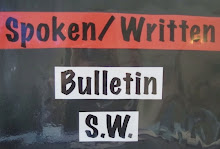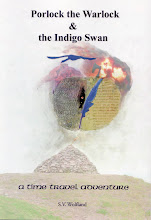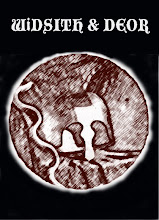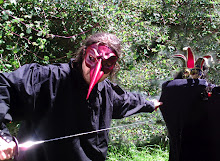This morning's radio show on Phonic FM - having been thinking about King Offa in the previous show but one about Geoffrey Hill's 'Mercian Hymns' - circled around Gildas the Monk's 'The Ruin of Britain' from the C6th, and the Anglo-Saxon Chronicle. The discussion was about different aspects of a historic conflict, that of the wars and battles in Britain between the Welsh/Britons and Scots/Picts, and Roman Empire and then leading on to the Angles/Saxons/Jutes. The invasion of Rome, the rule of Rome, Roman and Romano-British Britain, and the way that Gildas' account - deeply political, a polemical sermon basically, favoured the Romans. Then the way that the Anglo-Saxon Chronicle charted successes and less of the failures, the way it was written often long after the events it details, in many places, even though it's written in the form of an annual diary...the way that Gildas refers to things which 'everyone knew' and yet as one of very few records, of course, now we don't know! The gaps and the missing names, the obvious partisanship of historical texts...and we ended with 'The Ruin' poem from the C10th Exeter Book, as a classic re-imagining of the Roman times from a Saxon poet. It was really interesting - or at least, as topics and periods which we ourselves have discussed many times, it was great to actually try and structure a discussion to explain to folks who Gildas was, why these texts matter, why it is that they're so interesting, and of course, most importantly, what they can teach us now - not only about our own past, the past of the places we call or think of as home, but also about current conflicts. How things have very different versions depending on who is doing the telling! It's a point that's always worth drawing attention to, and more timely than usual just now.
One can argue for ever about whether one can or cannot learn from history, when technology changes even if humans don't, when history repeats itself but not in exactly the same way...but what is true, it seems to me, is that history can illuminate situations as well as give context to a geography.
It sometimes seems quite amazing to be given the opportunity to present a show where the whole kaleidoscope of arts, history and culture are available as subjects. Well, with a finite knowledge base, given shoehorning time for research into the day's tasks somewhere, anyway... My co-presenter always remembers his various and varied areas of knowledge, in a most impressive way. Whether post modern philosophy, the history of philosophy, the history of the English Civil War or the history of maths, he can lay his hands on the key names, dates and facts in a few moments... I on the other hand can read dozens of C19th novels, or study C18th garden history, philosophy, have a detailed knowledge of follies and folly landscapes or Tudor banqueting, Icelandic Saga facts, and then...after a while, it all becomes rusty. I know that I have known whatever it is, but can I recall it quickly or without preparation? Sadly not. Whether Expressionism, multimedia theatre as documented by Richard Kostelanetz, concrete and code poetry, the English Civil War, Anglo-Saxon poetry or Anglo-Saxon kings and culture, Surrealism or theatre history, sundials, astronomy, hydraulic automata, all of them passions and hobbies at different times and still. But could I now tell you the plot of Fanny Burney's 'Camilla' as distinct from 'Cecelia' and 'Evelina', or the names of other key characters? Or the actual difference between Trollope's 'Can You Forgive Her?' and 'He Knew He Was Right'? Disraeli's 'The Election' or 'Sybil'...? Errrrrmmmm.....
I know I have known these things and read them, but... However, luckily, whatever the faults of this morning's show, at least Deor didn't do what he often does, which is ask me a question the answer to which I can no longer remember, will remember much later, or couldn't possibly remember on only the one cup of instant coffee I've had time for! Doesn't matter what you know or how much, radio is a strange beast and a tricky medium...I'm much less inclined to criticise presenters on most stations now. Whatever I do or have known, nine times out of ten I sound like an idiot at some point on these shows, and if not 'erm', then radio picks ups your stopgaps and stock slang like nothing else. 'Wow', 'absolutely', 'I mean' all get picked up and stick in the ear. Ouch! That and sounding like you've got brains made of spaghetti. But these topics are so worthy of the attempt - it's worth it.
5 years ago





No comments:
Post a Comment